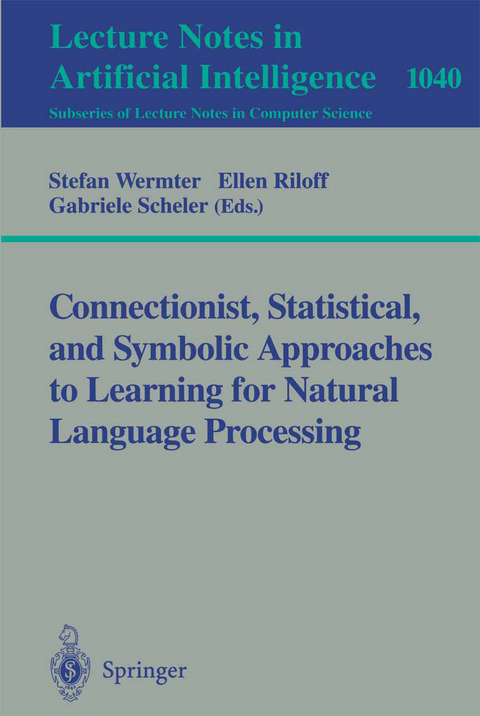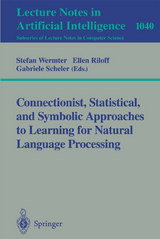Connectionist, Statistical and Symbolic Approaches to Learning for Natural Language Processing
Springer Berlin (Verlag)
978-3-540-60925-4 (ISBN)
This book is based on the workshop on New Approaches to Learning for Natural Language Processing, held in conjunction with the International Joint Conference on Artificial Intelligence, IJCAI'95, in Montreal, Canada in August 1995.
Most of the 32 papers included in the book are revised selected workshop presentations; some papers were individually solicited from members of the workshop program committee to give the book an overall completeness. Also included, and written with the novice reader in mind, is a comprehensive introductory survey by the volume editors. The volume presents the state of the art in the most promising current approaches to learning for NLP and is thus compulsory reading for researchers in the field or for anyone applying the new techniques to challenging real-world NLP problems.
Learning approaches for natural language processing.- Separating learning and representation.- Natural language grammatical inference: A comparison of recurrent neural networks and machine learning methods.- Extracting rules for grammar recognition from Cascade-2 networks.- Generating English plural determiners from semantic representations: A neural network learning approach.- Knowledge acquisition in concept and document spaces by using self-organizing neural networks.- Using hybrid connectionist learning for speech/language analysis.- SKOPE: A connectionist/symbolic architecture of spoken Korean processing.- Integrating different learning approaches into a multilingual spoken language translation system.- Learning language using genetic algorithms.- A statistical syntactic disambiguation program and what it learns.- Training stochastic grammars on semantical categories.- Learning restricted probabilistic link grammars.- Learning PP attachment from corpus statistics.- A minimum description length approach to grammar inference.- Automatic classification of dialog acts with Semantic Classification Trees and Polygrams.- Sample selection in natural language learning.- Learning information extraction patterns from examples.- Implications of an automatic lexical acquisition system.- Using learned extraction patterns for text classification.- Issues in inductive learning of domain-specific text extraction rules.- Applying machine learning to anaphora resolution.- Embedded machine learning systems for natural language processing: A general framework.- Acquiring and updating hierarchical knowledge for machine translation based on a clustering technique.- Applying an existing machine learning algorithm to text categorization.- Comparative results on using inductive logic programming for corpus-based parser construction.- Learning the past tense of English verbs using inductive logic programming.- A dynamic approach to paradigm-driven analogy.- Can punctuation help learning?.- Using parsed corpora for circumventing parsing.- A symbolic and surgical acquisition of terms through variation.- A revision learner to acquire verb selection rules from human-made rules and examples.- Learning from texts - A terminological metareasoning perspective.
| Erscheint lt. Verlag | 15.3.1996 |
|---|---|
| Reihe/Serie | Lecture Notes in Artificial Intelligence | Lecture Notes in Computer Science |
| Zusatzinfo | X, 474 p. |
| Verlagsort | Berlin |
| Sprache | englisch |
| Maße | 155 x 235 mm |
| Gewicht | 648 g |
| Themenwelt | Informatik ► Software Entwicklung ► User Interfaces (HCI) |
| Informatik ► Theorie / Studium ► Künstliche Intelligenz / Robotik | |
| Schlagworte | Algorithmisches Lernen • Artificial Intelligence • Cognition • Computational Learning • Genetic algorithms • Grammatical Inferenz • Grammatische Inferenz • Hardcover, Softcover / Informatik, EDV/Informatik • HC/Informatik, EDV/Informatik • Intelligence • Künstliche Intelligenz • learning • Learning Algorithms • Lern-Algorithmen • machine learning • Machine Translation • Maschinelles Lernen • Natural Language Procerssing • Natürliche Sprache • Natürlichsprachliche Verarbeitung |
| ISBN-10 | 3-540-60925-3 / 3540609253 |
| ISBN-13 | 978-3-540-60925-4 / 9783540609254 |
| Zustand | Neuware |
| Haben Sie eine Frage zum Produkt? |
aus dem Bereich




